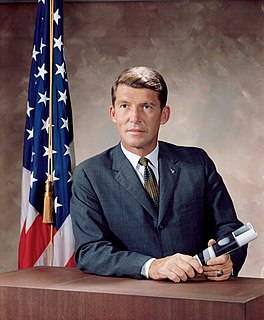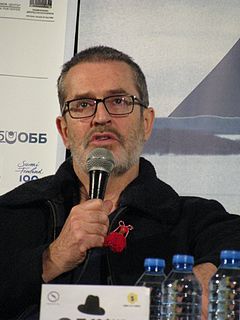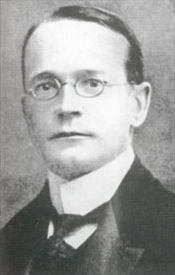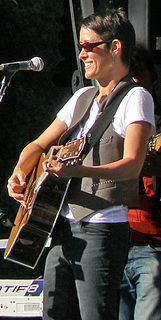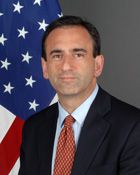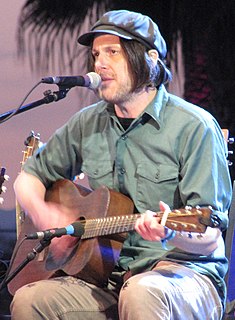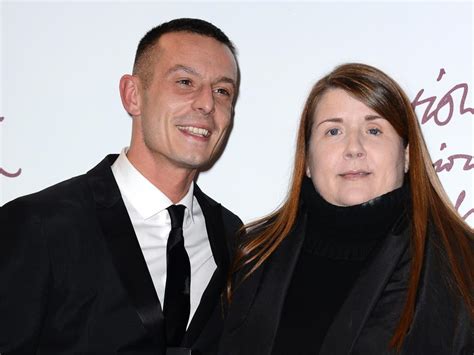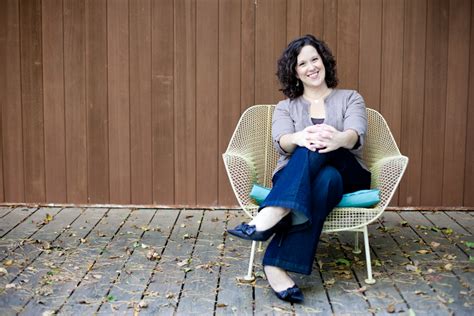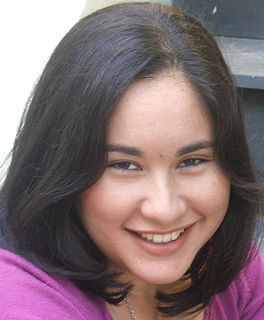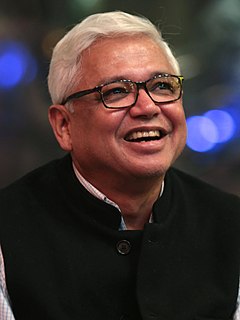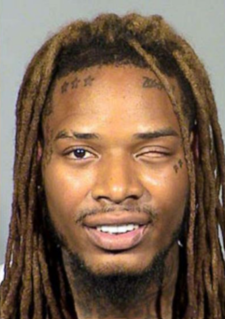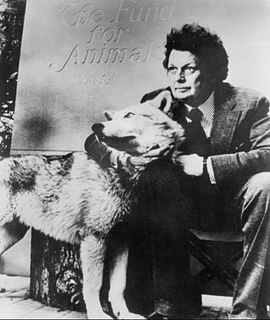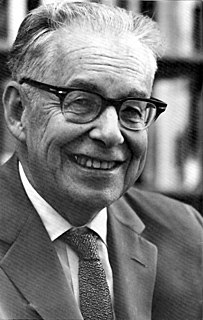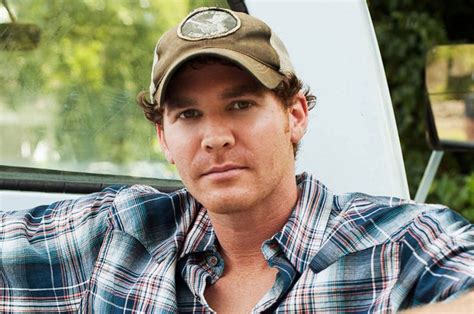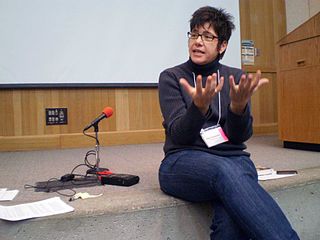Top 1200 Tipping Point Quotes & Sayings - Page 18
Explore popular Tipping Point quotes.
Last updated on December 18, 2024.
Shaw does not merely decorate a proposition, but makes his way from point to point through new and difficult territory. This explains why Shaw must either be taken whole or left alone. He must be disassembled and put together again with nothing left out, under pain of incomprehension; for his politics, his art, and his religion - to say nothing of the shape of his sentences - are unique expressions of this enormously enlarged and yet concentrated consciousness.
I know enough about the moon to know how unpleasant and inhospitable it is. . . . I know enough about Mars to know that you can't live there, you can't settle it. Mars and the moon are two ugly islands. So then, you say, what's the point of going to them? The point is to be able to say I've been there, I've set foot on them, and I can go further to look for beautiful islands.
I had gone to - that was my second time going to the mosque. And then at that time we met [with my wife], she was Muslim and - but was at a point where - because her father is an imam and her mother, though, is a convert, but she was basically raised Muslim. And she was at that point where she was deciding or trying to come to terms with her own relationship with Islam and how to embrace that for herself. So I was sort of trying to come walk toward it.
To teach effectively a teacher must develop a feeling for his subject; he cannot make his students sense its vitality if he does not sense it himself. He cannot share his enthusiasm when he has no enthusiasm to share. How he makes his point may be as important as the point he makes; he must personally feel it to be important.
The writer must always leave room for the characters to grow and change. If you move your characters from plot point to plot point, like painting by the numbers, they often remain stick figures. They will never take on a life of their own. The most exciting thing is when you find a character doing something surprising or unplanned. Like a character saying to me: ‘Hey, Richard, you may think I work for you, but I don’t. I’m my own person.’
Gideon laughed. "I like to be direct." "Okay," I said. "But I warn you, I like to be evasive, inserutable and generally send mixed messages." "I doubt it." "Human interaction is not my strong point," I told him. "Not seriously." "Seriously," I said. Thinking: There is so much about me he doesn't know. Gideon put his hand on my leg. "What's your strong point, then?" "Goats," I told him. "I am excellent with goats.
The point of recapitulation in the first movement of Beethoven's Ninth Symphony unleashes one of the most horrifyingly violent episodes in the history of music....The point is not to hold up Beethoven as exceptionally monstrous. The Ninth Symphony is probably our most compelling articulation in music of the contradictory impulses that have organized patriarchal culture since the Enlightenment. Moreover, within the parameters of his own musical compositions, he may be heard as enacting a critique of narrative obligations that is...devestating.
In Burton's day they [soldiers] were itching to get into the fray. Now it is the opposite. They are always whining about the dangers of being killed. Oh my God, they are such wimps now! The whole point of being in the Army is wanting to get killed, wanting to test yourself to the limits. Now you have to fly 15,000ft above the war zone to avoid getting hit. I don't think there is any point in having wars if that's how you're going to behave. It's pathetic. All this whining!
You cannot persist in wanting what you already have. If you assume you are what you desire to be to the point of ecstasy, you no longer want it. Your imaginal act is as much a creative act as a physical one wherein man halts, shrinks and is blessed, for as man creates his own likeness, so does your imaginal act transform itself into the likeness of your assumption. If, however, you do not reach the point of satisfaction, repeat the action over and over again until you feel as though you touched it and virtue went out of you.
I reached the point in my life now that I understand as human beings we've all done some very horrible things to other human beings, and at some point, I came to grips with the fact that whoever murdered my friend is now an adult, and all I can truly hopefully pray for is that in murdering my friend it bettered their life. And I don't mean that they gained things, but just that they grew up, they regret their decision, they found a place of spirituality or God or whatever people call it.
It's fair to say that there's something retrograde about putting the leader of Star Wars rebellion in the position of "slave in a bikini." There's no question that that's a fair point. But, it is true, and it's kind of remarkable, that at this point in our history, the slave girl, for a time in the bikini, is the one who chokes her captor with her bare hands and using the chain with which he bound her. That's powerful stuff. That's more retributive feminism than I think teenaged boys had ever seen.
If there is no point in the universe that we discover by the methods of science, there is a point that we can give the universe by the way we live, by loving each other, by discovering things about nature, by creating works of art. And that — in a way, although we are not the stars in a cosmic drama, if the only drama we're starring in is one that we are making up as we go along, it is not entirely ignoble that faced with this unloving, impersonal universe we make a little island of warmth and love and science and art for ourselves. That's not an entirely despicable role for us to play.
Evolution throws a wonderful light on all the struggles, eccentricities, tortuous developments of the human conscience in the past. It is the only theory of morals that does. And evolution throws just as much light on the ethical and social struggle today; and it is the only theory that does. What a strange age ours is from the religious point of view! What a hopeless age from the philosopher's point of view! Yet it is a very good age, the best that ever was. No evolutionist is a pessimist.
Photography has always been capable of manipulation. Even more subtle and more invidious is the fact that any time you put a frame to the world, it's an interpretation. I could get my camera and point it at two people and not point it at the homeless third person to the right of the frame, or not include the murder that's going on to the left of the frame. You take 35 degrees out of 360 degrees and call it a photo. There's an infinite number of ways you can do this: photographs have always been authored.
You can keep raising it, but at some point, everybody who believes in a minimum wage will say, "No, wait a minute. That's too much," and at that point, you have demonstrated that that there's no market relationship. You're just talking emotion. You're just talking "fairness." You're just talking being nice, and that's not how the market works. People aren't paid a wage because they're being nice to, or because it's fair. In the market, the market rules.
The various forms of education or ‘normalization’ imposed upon an individual consist in making him or her change points of subjectification, always moving towards a higher, nobler one in closer conformity with the supposed ideal. Then from the point of subjectification issues a subject of enunciation, as a function of a mental reality determined by that point. Then from the subject of enunciation issues a subject of the statement, in other words, a subject bound to statements in conformity with a dominant reality
I always tell people that I have never ever gone dancing in my life. But that's the point. It's the point of dreaming of doing it, imagining doing it. My music is like a fantasy version of it, not a practical version of it. With the way a club DJ would make a track - they are in the club, they know how to get people excited. I don't know how to get people excited. I'm just imagining euphoria; I'm not necessarily feeling it.
I don't think she ever had a single initiative at the United Nations that was not previously [vetted] by the people at the State Department, approved of, and authorized. She did manage to get around the world an awful lot, and find other parts of her vast slum project that needed repair. But I don't think that that was the main point. The main point was that she, after all, connoted Franklin Roosevelt, who by then was long dead, and had a certain prestige and power on that account.
There's no point going to a country which is torturing people to ask them to stop if they can point out that the United States is doing it too. It enormously weakens the argument. Back in the early days of the Bush administration, PEN made a decision that we would try and make human rights issues and civil rights issues in this country part of the priority, and not just international issues, which had more or less been the priority up until then.
I was in a prayer meeting yesterday. You gotta appreciate how scared, how scares folks on that side of the equation are. From their vantage point -- I really shouldnt say their -- cause its mine too, we are nearly at the end of time and from our vantage point, were going to be I think maybe Chinese Water torture is going to be the means the method, once Prop 8 gets instated and once preachers are held at gunpoint and forced to marry the homosexuals, Im pretty sure that that will be the signal for Jesus to come on back.
The point of public relations slogans like "Support Our Troops" is that they don't mean anything ... that's the whole point of good propaganda. You want to create a slogan that nobody is going to be against and I suppose everybody will be for, because nobody knows what it means, because it doesn't mean anything. But its crucial value is that it diverts your attention from a question that does mean something, do you support our policy? And that's the one you're not allowed to talk about.
If it takes several billion years to develop the building blocks which you need, like RNA and DNA, and then those can build multicellular life and then multicellular life can be honed with natural selection to a point where it becomes sentient like us, then at some point that sentient being can begin to manipulate the matter around it to build better sentient life.
Considering retirement? When that happens, I don't want that to be the story of whatever the season it is. I don't want to have to be talking about it all the time. My plan is when the time is up, it'll be time to hang it up. When that comes, it'll come. But right now, I don't have any clue as to when that'll be. It's been that way the last couple of years. . . . I've often felt if I ever get to a point where I don't want to go recruiting and can't get excited about it, then maybe it's time. That's a pretty good indication that's probably it. And I haven't reached that point at all yet.
We got the Iran sanctions done. We got an agreement by Russia to allow us to use Afghanistan to transit supplies for our forces. We got a Security Council resolution on Libya. We got Russia into the WTO to bring in to it a rules-based trading system. All of those things were in our interest. The point is not whether we should work with Russia. The point is whether we should sacrifice other important interests to do so.
It's to a writer's advantage to contain within himself elements of each sex, or any sex. It's to his advantage because it makes him able to write from the female point of view as well as the male. In some cases, of course, you will find some homosexual writers who can only write from a f - - -'s point of view. But I don't regard myself as a f - - -! Some people may. Also audiences wanted escapism. They don't like too much protest or criticism of their way of life.
Credible reports came through that Syria had used chemical weapons. Whether it's true actually is still open to question, but it's very probably true. At that point, what was at stake was what is called credibility. So if you read the political actors, political leadership, foreign policy commentary, they constantly point out accurately that US credibility was at stake, and we have to maintain US credibility. So therefore something had to be done to show you can't violate our orders.
At some point, you have to disconnect, if the obsession with playing a real person gets in the way of the movie at large. At the same time, we're all interested, as actors in trying to get as close to the real thing as we can, and whatever you can do in order to create that transformation feels fun and, for me, the furthest I can get away from myself is fun. It's all part of the costume, the accent, and all that stuff. It's about trying to get close without it being a detriment to the point of view of the story that you're trying to tell.
Typically there are little fragments of specific words and images swimming around in my mind, and then at some point, I'll sit down with the guitar and everything will fall into place. It's like your brain is a drain with a bunch of words and images dropping into it, swirling around. The drain is stopped up, but you can feel these things dropping into it. Then at some point, someone comes along and pulls the plug out of the drain and everything comes together in the song.
Students may feel the criticism is harsh, but I think it's possible they haven't had criticism before. It's my job to point out when something is badly done, or when there's no point of view. To build a brand you have to have something about you. If not personality, then some thought process. I'm 40, and they're young, so they're meant to be informing me. They should be bringing me a book or something that I haven't seen, not like some obscure chant book by Dominican monks, but an image of the way they see the world.
The world isn't perfect, and some days it wears you down. You can either accept that, and face it, and be a help to others instead of a hindrance. Or you can decide the rules are too tough and they shouldn't apply to you, and you can ignore them and make things harder for everybody else. Sometimes life is about being sad and doing things anyway. Sometimes it's about being hurt and doing things anyway. The point isn't perfection. The point is doing it anyway.
My friendships, they are a very strong part of my life, they are as light as gossamer but also they are as strong as steel. And I cannot throw them off, nor altogether do with them or without them. And I love them at the point where they say: It is nice to see you again. And I love them too at the point when they say: Good-bye, come again soon. The rhythm of friendship is a very good rhythm.
This whole time, my whole life, that harsh, stony path was leading up to this one point. I followed it blindly, stumbling along the way, scraped and weary, without any idea of where it was leading, without ever realizing that with every step I was approaching the light at the end of a very long, dark tunnel. And now that I've reached it, now that I'm here, I want to catch it in my hand, hold onto it forever to look back on - the point at which my new life really began.
You see, in our family we don't know whether we're coming or going - it's all my grandmother's fault. But, of course, the fault wasn't hers at all: it lay in language. Every language assumes a centrality, a fixed and settled point to go away from and come back to, and what my grandmother was looking for was a word for a journey which was not a coming or a going at all; a journey that was a search for precisely that fixed point which permits the proper use of verbs of movement.
By 1938, Eleanor Roosevelt was so angry at FDR's policies, she writes a book called This Troubled World. And it is actually a point-by-point rebuttal of her husband's foreign policy. We need collective security. We need a World Court. We need something like the League of Nations. We need to work together to fight fascism. We need embargoes against aggressor nations, and we need to name aggressor nations. All of which is a direct contradiction of FDR's policies.
If we have goals and dreams and we want to do our best, and if we love people and we don’t want to hurt them or lose them, we should feel pain when things go wrong. The point isn’t to live without any regrets, the point is to not hate ourselves for having them… We need to learn to love the flawed, imperfect things that we create, and to forgive ourselves for creating them. Regret doesn’t remind us that we did badly — it reminds us that we know we can do better.
The adult May fly lives only a few hours, just long enough to mate. He has neither mouth nor stomach, but needs neither since he does not live long enough to need to eat. The eggs the May fly leaves hatch after the parent has died. What is it all about. What's the point? There is no point. That's just the way it is. It is neither good nor bad. Life is mainly simply inevitable. (41)
The dark aftermath of the frontier, of the vast promise of possibility this country first offered, is an inflated sense of American entitlement today. We want what we want, and we want it now. Easy credit. Fast food. A straight shot down the interstate from point A to point B. The endless highway is crowded with the kinds of cars large enough to take a mountain pass in high snow. Instead they are used to take children from soccer practice to Pizza Hut. In the process they burn fuel like there's no tomorrow. Tomorrow's coming.
The point of my music? The point I just want to get across is I'm me and I exist. Just letting people know who I am. Ever since I was young, I was the little attention grabber; I always loved attention. I want to grab people's attention. I want them listen to me and know that this is really good music. Whether they like it or not, they're gonna listen.
The deer aren't our prey or our possessions -- they're us. They're us at one point in the cycle of life and we're them at another point in the cycle. The deer are twice your parents, for your mother and father are deer, and the deer that gave you its life today was mother and father to you as well, since you wouldn't be here if it weren't for that deer.
The Divine Comedy is a political poem and when you say poetry is not about - he's always quoted out of context, that "poetry makes nothing happen," that doesn't mean you shrug your shoulders and don't try to make anything happen. And Dante felt that poetry was engaged, there was a point of view; it's not my point of view, it's orthodox medieval Christianity, and I have my troubles with that. He didn't feel that you could just rule out so important a section of life - we care about these things, and it's out of caring about them that we write poetry.
You start to stress yourself out about the people around you. You start to think, like, "What do you really want from me?" And then you forget that you, at some point, asked them for something. At some point you needed them to take you in because you ain't had nowhere to go. And now you turn around and question their loyalty to you, and those were the only people loyal to you. The only people that really loved you are still there, and you tanked on them. I'll never let that happen.
We are getting close to the point where as every platform of tech that has any level of scale gets bought by either Google or Facebook or sometimes Microsoft. We are getting to the point where we see some oligopoly in terms of behavior online, and that it's really problematic because the oligopolies are completely non transparent, they are terrible in terms of labor and economic equality and they support systems of surveillance. It can create a world where we are all placed in bubbles, where the systems themselves can be manipulated by people who don't have our best interests in mind.
Scientifically, I know beginnings don’t exist. The world is made of energy, which is neither created nor destroyed. Everything she is was here before me. Everything she was will remain. Her existence touches both my past and my future at one point—infinity. Lifelines aren’t lines at all. They’re more like circles. It’s safe to start anywhere and the story will curve its way back to the starting point. Eventually. In other words, it doesn’t matter where I begin. It doesn’t change the end.
I'm not really a political-type person, meaning that I don't really make great stands or whatever, but if you ask me a direct question I say it shouldn't matter who you are, whether you're black, white, green, gay, male, female. If you can do a job and do it well you should be paid for it, you should be respected for it, and you have to be responsible. I think sometimes people can go too fare trying to make a point. I think they should just make their point and go on about.
Media is everything, and when you live in Los Angeles and you live in New York, it's almost impossible to run into a conservative point of view because the conservatives that exist in Hollywood, where much of the media's done, and the conservatives that live in New York where a lot of the media's done are fearful of even expressing their conservative point of view.
The form of government that is most suitable to the artist is no government at all. ... One might point out how the Renaissance was great, because it sought to solve no social problem, and busied itself not about such things, but suffered the individual to develop freely, beautifully, and naturally, and so had great and individual artists, and great, individual men. One might point out how Louis XIV, by creating the modern state, destroyed the individualism of the artist.
Financial markets are supposed to swing like a pendulum: They may fluctuate wildly in response to exogenous shocks, but eventually they are supposed to come to rest at an equilibrium point and that point is supposed to be the same irrespective of the interim fluctuations. Instead, as I told Congress, financial markets behaved more like a wrecking ball, swinging from country to country and knocking over the weaker ones. It is difficult to escape the conclusion that the international financial system itself constituted the main ingredient in the meltdown process.
Our time has been distinguished, more than by anything else, by a mastery, a control, of the external world, and by an almost total forgetfulness of the internal world. If one estimates human evolution from the point of view of knowledge of the external world, then we are in many respects progressing. If our estimate is from the point of view of the internal world, and of oneness of internal and external, then the judgment must be very different.
What is the point of abusing yourself with guilt in the first place? If you did make a mistake and act in a hurtful way, your guilt won't reverse your blunder in some magical manner. It won't speed your learning processes so as to reduce the chance you'll make the same mistake in the future. Other people won't love and respect you more because you are feeling guilty and putting yourself down in this manner. Nor will your guilt lead to productive living. So what's the point?
It used to be said that, socially speaking, Philadelphia asked who a person is, New York how much is he worth, and Boston what does he know. Nationally it has now become generally recognized that Boston Society has long cared even more than Philadelphia about the first point and has refined the asking of who a person is to the point of demanding to know who he was. Philadelphia asks about a man's parents; Boston wants to know about his grandparents.
It is for Muslim scholars to study the whole history of Islamic science completely and not only the chapters and periods which influenced Western science. It is also for Muslim scholars to present the tradition of Islamic science from the point of view of Islam itself and not from the point of view of the scientism, rationalism and positivism which have dominated the history of science in the West since the establishment of the discipline in the early part of the 20th century in Europe and America.
Magnitude may be compared to the power output in kilowatts of a [radio] broadcasting station; local intensity, on the Mercalli or similar scale, is then comparable to the signal strength noted on a receiver at a given locality. Intensity, like signal strength, will generally fall off with distance from the source; it will also depend on local conditions at the point of observation, and to some extent on the conditions along the path from source to that point.
I'm a strong believer in telling stories through a limited but very tight third person point of view. I have used other techniques during my career, like the first person or the omniscient view point, but I actually hate the omniscient viewpoint. None of us have an omniscient viewpoint; we are alone in the universe. We hear what we can hear... we are very limited. If a plane crashes behind you I would see it but you wouldn't. That's the way we perceive the world and I want to put my readers in the head of my characters.
In relation to God, we are like a thief who has burgled the house of a kindly householder and been allowed to keep some of the gold. From the point of view of the lawful owner this gold is a gift; Form the point of view of the burglar it is a theft. He must go and give it back. It is the same with our existence. We have stolen a little of God's being to make it ours. God has made us a gift of it. But we have stolen it. We must return it.
I don't like my movies. I prefer John Ford's movies. I've made some movies that are interesting, or that have some point, or are more or less beautiful. But I've never made anything big to me, from my point of view. "Big" like John Ford or someone of that kind. I say John Ford because he is my favorite director.
The first time I go out to Nashville, ever (at this point I had only heard the rumors about what it's like) I had three writing sessions set up. The first two canceled on me. I was kind of pissed off at that point. So I just went back to my hotel room and started writing. And even though I've been to L.A. and experienced a lot of things, at the end of the day I just start to feel like I'm playing acoustically at the first bar I ever played at.
You think to yourself, “If one drink feels really good and two feels really, really good, a hundred ought to feel fantastic.” As sane people know, it doesn't work that way. A hundred drinks feels terrible. Bad things happen. But the addict keeps at it, thinking at some point it's going to get good again The point is to not feel what you're feeling. The problem is, you become someone you never thought you would become, and you have no idea how you got there.

